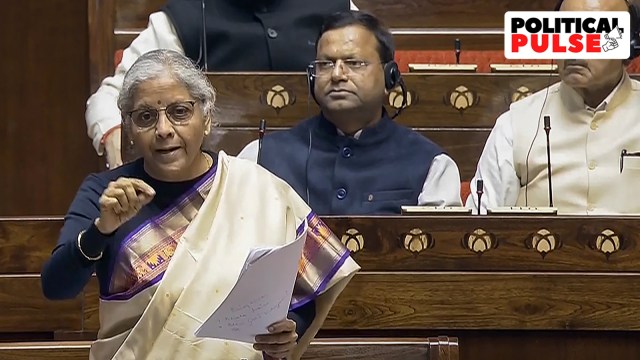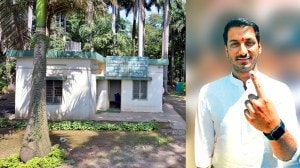Vikas Pathak is deputy associate editor with The Indian Express and writes on national politics. He has over 17 years of experience, and has worked earlier with The Hindustan Times and The Hindu, among other publications. He has covered the national BJP, some key central ministries and Parliament for years, and has covered the 2009 and 2019 Lok Sabha polls and many state assembly polls. He has interviewed many Union ministers and Chief Ministers. Vikas has taught as a full-time faculty member at Asian College of Journalism, Chennai; Symbiosis International University, Pune; Jio Institute, Navi Mumbai; and as a guest professor at Indian Institute of Mass Communication, New Delhi. Vikas has authored a book, Contesting Nationalisms: Hinduism, Secularism and Untouchability in Colonial Punjab (Primus, 2018), which has been widely reviewed by top academic journals and leading newspapers. He did his PhD, M Phil and MA from JNU, New Delhi, was Student of the Year (2005-06) at ACJ and gold medalist from University Rajasthan College in Jaipur in graduation. He has been invited to top academic institutions like JNU, St Stephen’s College, Delhi, and IIT Delhi as a guest speaker/panellist. ... Read More
White Paper in Parliament, why BJP is keeping guns trained on Cong: ‘Regional allies not permanent foes’
BJP leaders point to shrinking INDIA alliance, add that some regional parties may become overt allies and some others, "in badmouthing Congress and spoiling its chances, inadvertently act like covert allies"
 On Thursday, the BJP government released a “White Paper” that was yet another scathing criticism of the Congress-led UPA government’s handling of the economy during its tenure from 2004 to 2014. (PTI)
On Thursday, the BJP government released a “White Paper” that was yet another scathing criticism of the Congress-led UPA government’s handling of the economy during its tenure from 2004 to 2014. (PTI)From attacking the INDIA bloc as “ghamandia (arrogant)” and calling it “INDI” alliance, Prime Minister Narendra Modi has trained his guns exclusively on the Congress in his recent speeches in Parliament. And on Thursday, the BJP government released a “White Paper” that was yet another scathing criticism of the Congress-led UPA government’s handling of the economy during its tenure from 2004 to 2014.
In scathing criticism of the UPA government’s management of the economy, the document said the UPA government failed miserably to facilitate economic activities. “Instead the UPA Government created hurdles that held back the economy. It basked in the afterglory of the lagged effects of the reforms of the Vajpayee-led NDA government and benign global conditions and proceeded to exploit the resultant fast economic growth for narrow political purposes without much concern for long-term economic consequences. The result was a mountain of bad loans, a high fiscal deficit despite much of it being hidden, a high current account deficit, double-digit inflation for five years which hit the pockets of many Indians and membership of the club of “Fragile Five” in 2013,” it said.
The document went on to say, “They (UPA) not only failed to impart dynamism into the economy but also robbed the economy of it such that our industrialists went on record stating that they would rather invest abroad than in India. To drive investors away is easy but to win them back is hard. The UPA government also demonstrated that it is easier to hurt the economy than it is to help it. They inherited a healthy economy and bequeathed an enfeebled one to us. We have restored its vitality.”
While the document focused on the economy, Modi in his speeches in the two Houses of Parliament attacked the Congress on all possible grounds — as “anti-Dalit, anti-Adivasi and anti-OBC”, as being influenced by colonial thinking, and as being a vehicle of “misgovernance” for decades after independence — and started the attacks right from the time of Jawaharlal Nehru to the present leadership of Rahul Gandhi.
Explaining the PM’s “attack only Congress” policy, a BJP insider told The Indian Express, “If you notice, the party was attacking the Opposition as ghamandia and as INDI, rather than what it was calling itself, till months ago, as there was some possibility of the Opposition parties rallying together to take on the BJP. But with the exit of Nitish Kumar from the INDI alliance, and with Mamata Banerjee and AAP deciding to go it alone in Bengal and Punjab, respectively, the INDI alliance is basically just the Congress now, which explains why the attack should be focused on it.”
A BJP leader said that “one should choose one’s friends and foes wisely”, adding that with the exit of Nitish, and with multiple news reports saying the Rashtriya Lok Dal (RLD) may cross over to the BJP-led NDA, the regional parties were not necessarily the BJP’s chief rivals in the coming elections. “Some may become our overt allies and some others, in badmouthing the Congress and spoiling its chances, will inadvertently act like covert allies. Why should we attack them?” asked the party functionary.
A BJP insider added another perspective. If regional parties in states where the BJP has a significant presence are routinely passing statements or acting in ways that embarrass the Congress, it suits the BJP to project the election as a national contest between the BJP and a beleaguered Congress.
“If Modi ji starts attacking Mamata Banerjee from Delhi, will it not raise her stock in Bengal? So, when she is attacking Rahul Gandhi, why not focus on the Congress so that voters there feel that this is a national election and that the BJP is going to win the Lok Sabha with a huge margin against a directionless Congress? When no regional party without a serious tie-up with Congress can damage the BJP at the all-India level, it makes sense to now focus our attacks on the Congress rather than disperse them. However, our regional leaders will keep attacking these parties, as is a common practice in state politics,” said the leader.
Congress leaders also believe that the Prime Minister wants to project their party as his main challenger although the ruling party is up against regional parties in some states. One leader said Modi seems keen to reinforce the Congress-BJP and UPA-NDA binaries. “It is clear that he wants to frame the election as a contest between the Congress and the BJP … he has defeated us twice in parliamentary elections and several state polls since 2014. He may also want to project the election as a BJP and the Congress to edge out regional parties … ,” said a Congress leader.



- 01
- 02
- 03
- 04
- 05





























